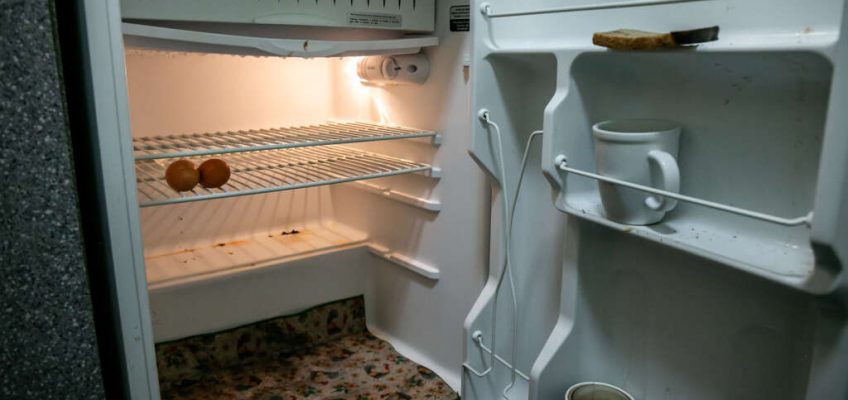“New York needs a comprehensive, modernized infrastructure to get food to hungry older adults and a system that goes beyond the outdated model of providing just one meal per day, five days a week.”
The near-bare refrigerator of a senior enrolled in the city’s home-delivered meals program last summer. Photo by Adi Talwar for City Limits.
Every New Yorker has a stake in how our city cares for its oldest residents—whether they’re our parents, grandparents, neighbors, or ourselves in the years to come. This reality takes on new urgency as our city is now home to a record 1.8 million older adults—more than the number of school-age children. A recent report found that the number of older adults living in poverty in New York City rose over 33 percent in the past 10 years, revealing a crisis throughout the five boroughs.
These striking numbers should concern all of us. Research by Citymeals and the CUNY Urban Food Policy Institute found that 60 percent of older New Yorkers relying on home-delivered meal programs experienced food insecurity in the past year, with 65 percent living on less than $15,000 annually in one of America’s most expensive cities.
Even more troubling, the study found that 50 percent of those surveyed had never received any pension or retirement income, and 32 percent had never received Social Security benefits. As food, housing, and medical costs surge alongside our growing elderly population, we need to reimagine our approach to ending elder hunger.
The path forward is clear: city leaders must significantly increase funding for older adult nutrition programs. New York needs a comprehensive, modernized infrastructure to get food to hungry older adults and a system that goes beyond the outdated model of providing just one meal per day, five days a week.
Meal delivery programs are lifelines for New Yorkers like Jewel, a 78-year-old Bronx resident and former pediatric nurse’s assistant. Since suffering a stroke in 2001 that left her with severe vertigo, she rarely leaves her apartment. After overcoming tremendous personal challenges and serving others for decades, she now struggles with the basic necessity of feeding herself.
“I can prepare simple meals,” she says, “anything that’s easy, so I don’t have to stand up.” But even with her cane, Jewel can’t be on her feet for long. She relies on home-delivered meals for her most consistent support—one meal a day for the past eight years. But as essential as that support is, it doesn’t go far enough to provide food security.
The 1965 Older Americans Act established a federal program requiring only one meal a day, five days a week for older Americans in need. Sixty years later, this is drastically insufficient. Over 50 percent of meal recipients say they need two or more meals daily, with many describing the current service as “appreciated, but just not enough.” People cannot age safely in place while hungry and at risk of malnutrition.
This is not just a moral imperative but a fiscally responsible investment. A full year of home-delivered meals costs the equivalent of just one month in a nursing facility or one week in a hospital. Adequate nutrition helps older adults like Jewel remain home, avoiding costly hospitalizations and institutional care that burden our healthcare system and city budget.
RELATED READING: For Many Older New Yorkers, Home-Delivered Meals Offer More Than Food
The evidence is compelling: 87 percent of meal recipients report that these services help them remain in their own homes, 85 percent say the meals help them eat more healthily, and 81 percent say that meals help them manage health conditions. These outcomes save money across multiple city agencies by reducing emergency healthcare needs.
Citymeals has launched several innovative pilot programs in response to this data, including delivering breakfast boxes that provide a second daily meal for the most food insecure recipients and an expanded mobile grocery program. But these efforts alone cannot meet the escalating need.
During this budget cycle, New York City must significantly increase funding for expanded nutrition programs that go beyond the outdated one-meal-a-day model. Recently introduced legislation by Councilmember Linda Lee would require that home-delivered meals be delivered each day of the calendar year—one solution that’s part of a broader campaign to increase vital funding for aging services in New York City and statewide.
More than half of Citymeals recipients are over 80 years old, nearly 20 percent are over 90, and almost 400 have lived at least a century. These vulnerable New Yorkers deserve a comprehensive, modernized approach that recognizes food as a human right and as essential preventive medicine, not a supplement. By investing proactively in food security for older adults, we make a sound fiscal decision that also aligns with our values as New Yorkers.
We cannot allow New Yorkers who built this city to spend their final years hungry and alone. Our elected officials must commit to the funding that matches the scale of this challenge, ensuring older New Yorkers can age in place with dignity.
Beth Shapiro is the CEO of Citymeals on Wheels.
The post Opinion: Older New Yorkers Built This City—Now They’re Going Hungry appeared first on City Limits.


Leave a Reply